 1 citations,
August 2021 in “Movement disorders clinical practice”
1 citations,
August 2021 in “Movement disorders clinical practice” A man with Isaac's syndrome affecting only one side of his body improved after immune system-targeted treatment.
 1 citations,
April 2018 in “Journal of Investigative Dermatology”
1 citations,
April 2018 in “Journal of Investigative Dermatology” Tofacitinib helped most patients with alopecia areata regrow hair and changes in immune cells were linked to the treatment's effectiveness.
 1 citations,
August 2016 in “Journal of Investigative Dermatology”
1 citations,
August 2016 in “Journal of Investigative Dermatology” Activating STAT5 in the skin's dermal papilla is key for starting hair growth, regenerating hair follicles, and healing wounds.
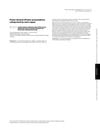 1 citations,
October 2014 in “Annals of oncology”
1 citations,
October 2014 in “Annals of oncology” Paclitaxel and nab-paclitaxel can be safe and effective for advanced gastric cancer patients on hemodialysis.
 June 2020 in “Journal of Investigative Dermatology”
June 2020 in “Journal of Investigative Dermatology” Tiny particles from skin cells can help activate hair growth.
 September 2018 in “Fertility and Sterility”
September 2018 in “Fertility and Sterility” High levels of testosterone and anti-Müllerian hormone before pregnancy are linked to a higher risk of newborns needing intensive care.
 June 2017 in “Experimental and Therapeutic Medicine”
June 2017 in “Experimental and Therapeutic Medicine” The anti-CXCL4 antibody helps mice grow hair faster and prevents hair loss.
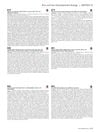 April 2017 in “Journal of Investigative Dermatology”
April 2017 in “Journal of Investigative Dermatology” Triptolide effectively and safely reduces actinic keratosis lesions in mice.
 April 2017 in “Journal of Investigative Dermatology”
April 2017 in “Journal of Investigative Dermatology” Cow milk sugars increase fat production and inflammation in skin oil cells.
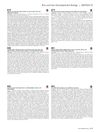 April 2017 in “Journal of Investigative Dermatology”
April 2017 in “Journal of Investigative Dermatology” A boy with Oculodentodigital syndrome had a unique GJA1 gene mutation causing his symptoms.
 April 2017 in “Journal of Investigative Dermatology”
April 2017 in “Journal of Investigative Dermatology” The BMP/Smads pathway and Id2 gene control hair follicle stem cells, affecting their rest and growth phases.
 April 2017 in “Journal of Investigative Dermatology”
April 2017 in “Journal of Investigative Dermatology” Scientists created a tiny, 3D model of a hair follicle that grows and acts like a real one.
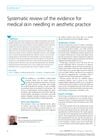 February 2017 in “Journal of Aesthetic Nursing”
February 2017 in “Journal of Aesthetic Nursing” Skin needling is a safe, effective, and affordable treatment for various skin issues and enhances other aesthetic procedures.
 August 2016 in “Journal of Investigative Dermatology”
August 2016 in “Journal of Investigative Dermatology” The enzyme CD73 helps control human hair growth and could be targeted to treat hair growth disorders.
 August 2016 in “Journal of Investigative Dermatology”
August 2016 in “Journal of Investigative Dermatology” Blocking the CCR5 receptor may be a new way to treat hair loss from alopecia areata.
 August 2016 in “Journal of Investigative Dermatology”
August 2016 in “Journal of Investigative Dermatology” Human hair follicles have a scent receptor that can influence hair growth.
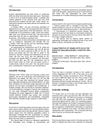 November 2011 in “Journal of Infection”
November 2011 in “Journal of Infection” Many women with HIV in the North of England are diagnosed late and have other health conditions.
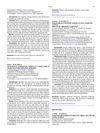 September 2011 in “Clinical Biochemistry”
September 2011 in “Clinical Biochemistry” Glycoconjugates help heal hair follicles during skin repair.
 August 2010 in “Journal of Investigative Dermatology”
August 2010 in “Journal of Investigative Dermatology” New hair regrowth model introduced, imiquimod kills skin cancer cells, T-cadherin loss makes skin cancer more invasive, no strong link between PTCH1 gene and skin cancer after transplant, and male teens more likely to have hereditary hair loss.
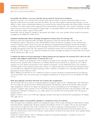 July 2010 in “British Journal of Dermatology”
July 2010 in “British Journal of Dermatology” New hair regrowth model proposed, imiquimod found to kill skin cancer cells, T-cadherin loss linked to invasive skin cancer, no clear gene link to skin cancer after transplant, and study on children's hair loss shows male dominance and genetic ties.
 October 2020 in “Journal of Pakistan Association of Dermatology”
October 2020 in “Journal of Pakistan Association of Dermatology” Platelet-rich plasma therapy is more effective than minoxidil lotion for increasing hair count in men with hair loss, with mild side effects and high satisfaction.
 April 2019 in “Advances in integrative medicine”
April 2019 in “Advances in integrative medicine” HST and HST/F promote hair growth and may help treat alopecia.
 April 2017 in “Journal of Investigative Dermatology”
April 2017 in “Journal of Investigative Dermatology”  May 2016 in “The Journal of Sexual Medicine”
May 2016 in “The Journal of Sexual Medicine”  1533 citations,
October 2008 in “Endocrine reviews”
1533 citations,
October 2008 in “Endocrine reviews” Mice without the vitamin D receptor have bone issues and other health problems, suggesting vitamin D is important for preventing various diseases in humans.
 1461 citations,
March 2004 in “Annals of oncology”
1461 citations,
March 2004 in “Annals of oncology” Pegylated liposomal doxorubicin is as effective as conventional doxorubicin but causes fewer heart problems and side effects.
 991 citations,
January 2011 in “Nature Reviews Endocrinology”
991 citations,
January 2011 in “Nature Reviews Endocrinology” The document concludes that PCOS is a complex disorder caused by both genetic and environmental factors, affecting women's health in various ways, and requires personalized treatment.
 989 citations,
August 2007 in “The Lancet”
989 citations,
August 2007 in “The Lancet” PCOS is a complex condition with major health impacts, needing more research for better diagnosis and treatment.
 773 citations,
August 2017 in “International Journal of Molecular Sciences”
773 citations,
August 2017 in “International Journal of Molecular Sciences” The secretions of mesenchymal stem cells could be used for healing without using the cells themselves.
 688 citations,
June 2007 in “Cell Stem Cell”
688 citations,
June 2007 in “Cell Stem Cell” Removing the ATR gene in adult mice causes rapid aging and stem cell loss.






























